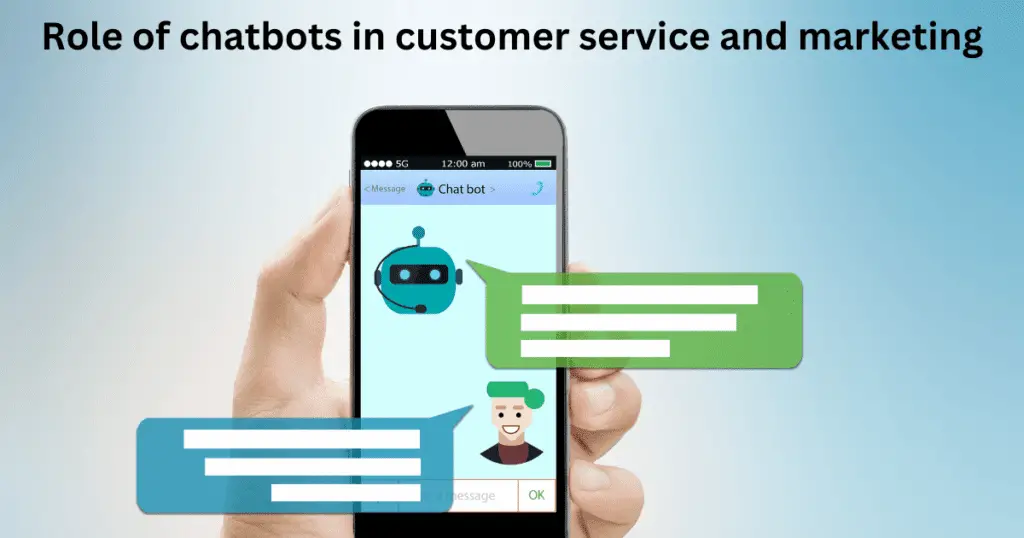In the dynamic realm of customer service and marketing, the emergence of chatbots marks a transformative epoch. These conversational agents, propelled by artificial intelligence, are reshaping the dynamics of business-customer interactions. This assessment delves into the pivotal impact of chatbots on customer service and marketing, delving into the intricate layers of innovation that fuel heightened customer engagement and the optimization of marketing strategies.
Chatbots are not just automated responders; they are dynamic tools reshaping the customer experience. As we delve into their role, it becomes evident that these digital entities transcend mere functionalities. They are catalysts for 24/7 customer availability, personalized interactions, and efficient marketing campaigns. This review adopts a positive outlook, shedding light on the myriad ways in which chatbots elevate customer service and redefine marketing paradigms.
1. The Evolution of Customer Service and Marketing
To comprehend the impact of chatbots, it’s crucial to trace the evolution of customer service and marketing. Traditional models often faced challenges in providing real-time support and personalized interactions. As customer expectations soared, businesses sought innovative solutions. The rise of the internet paved the way for online customer service, and subsequently, chatbots emerged as the next frontier.
2. Chatbots: A Revolution in Customer Interaction
Enhancing Customer Engagement
Chatbots serve as dynamic conversationalists, transforming customer interactions into engaging dialogues. Through natural language processing (NLP), these bots decipher user inputs, providing responses that mimic human conversations. This not only resolves queries promptly but also fosters a sense of interaction akin to speaking with a human representative.
24/7 Availability
One of the standout features of chatbots is their perpetual availability. Unlike human agents constrained by working hours, chatbots tirelessly respond to customer inquiries around the clock. This ensures that businesses can provide consistent support to a global audience, irrespective of time zones. The continuous availability contributes to customer satisfaction and loyalty.
Personalization
Chatbots, armed with data analytics and machine learning algorithms, offer a personalized touch to interactions. By analyzing customer preferences and past interactions, chatbots can tailor responses and recommendations. This level of personalization not only enhances the customer experience but also plays a pivotal role in marketing strategies, as it allows for targeted communication.
3. Chatbots in Marketing: A Dynamic Duo
Lead Generation
In the realm of marketing, chatbots emerge as adept lead generators. Through proactive engagement, they can qualify leads by collecting relevant information from users. By initiating conversations and guiding users through product or service offerings, chatbots become invaluable assets in the lead generation process.
Customer Segmentation
Efficient marketing hinges on understanding the audience. Chatbots, with their ability to analyze user data, contribute to effective customer segmentation. This segmentation enables businesses to tailor marketing messages, ensuring that promotions and campaigns resonate with specific target demographics.
Elevating User Experience
User experience is paramount in the digital age. Chatbots play a crucial role in elevating user experiences by providing instant responses, simplifying navigation, and offering personalized recommendations. This positive user experience translates into enhanced brand perception and customer satisfaction.
4. Overcoming Challenges and Enhancing Efficiency
Addressing Miscommunication
While chatbots excel in many areas, challenges such as miscommunication can arise. Natural language understanding is complex, and misunderstandings can occur. However, continuous improvements in NLP algorithms and regular updates mitigate this challenge, ensuring more accurate interpretations over time.
Integration with Human Agents
A seamless integration between chatbots and human agents is pivotal. There are scenarios where human intervention is necessary, especially in complex problem-solving or situations requiring empathy. Businesses must design systems that facilitate a smooth handover between chatbots and human representatives, ensuring a cohesive and comprehensive customer service approach.
Data Security
The collection and analysis of customer data raise concerns about data security. Businesses must prioritize robust security measures to protect sensitive information. Implementing encryption protocols and complying with data protection regulations are imperative to build and maintain customer trust.


5. Success Stories: Realizing the Potential
Industry-Specific Implementations
Chatbots have made significant strides across various industries. In e-commerce, they assist customers in navigating product catalogs and making purchase decisions. In healthcare, they offer preliminary medical advice. Industries as diverse as finance, travel, and education have witnessed transformative effects through tailored chatbot implementations.
Quantifiable Benefits
The success of chatbots is not anecdotal; it is backed by quantifiable benefits. Businesses report increased efficiency, cost savings, and higher customer satisfaction rates. Chatbots streamline processes, reduce response times, and contribute to revenue growth through enhanced marketing and sales initiatives.
Conclusion
As we reflect on the role of chatbots in customer service and marketing, the conclusion is not a mere summary; it’s a celebration of empowerment. Chatbots empower businesses to provide unparalleled customer experiences. They bridge gaps, dissolve barriers of time and geography, and contribute to the evolution of marketing into a more personalized and efficient endeavor. In a world where customer expectations are ever-expanding, chatbots stand as beacons, guiding businesses toward a future where interactions are not just transactions but meaningful connections.
Frequently Asked Questions (FAQs)
Q1. How do chatbots enhance customer engagement?
Chatbots enhance engagement through natural language processing, mimicking human conversations. They provide prompt responses, resolving queries, and fostering interactive dialogues.
Q2. Can chatbots work 24/7?
Yes, one of the key advantages of chatbots is their 24/7 availability. Unlike human agents, chatbots can respond to customer inquiries at any time, ensuring consistent support.
Q3. How do chatbots contribute to lead generation?
Chatbots contribute to lead generation by proactively engaging users, collecting relevant information, and guiding them through product or service offerings, qualifying leads in the process.
Q4. What challenges do businesses face in implementing chatbots?
Challenges include potential miscommunication due to natural language understanding complexities, the need for seamless integration with human agents, and ensuring robust data security measures to protect sensitive information.

